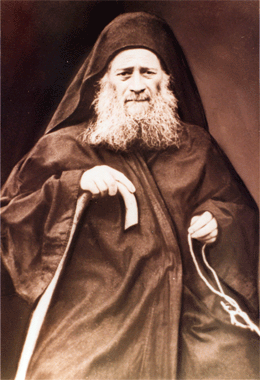
I think it is very easy to forget that the great saints whom we commemorate on our Orthodox calendar, day in and day out, were human. Yes, they have been now glorified by God and crowned and they intercede for us sinners daily at Christ's dread judgment seat. They have finished the race in glory, but they started the race in a much different state. But, too often, we forget that.
Even if we are in the presence of a person who just exudes holiness, exudes the grace of God from him or her just being in the room, humbled and awed as we may be, we must never forget that even these people have "human needs" as do the rest of us. Sure, they eat, though they may eat far less. They sleep, though they may sleep much less. They pray, but pray for a lot longer and more fervently than what we can begin to imagine. A fellow blogger at MYSTAGOGY posted this wonderful story.
By Metropolitan Athanasios of Limassol
Many years ago when I was at Katounakia [a rugged area in the southeast of the Athonite peninsula] I would often spend time with that great contemporary holy elder Father Ephraim [Katounakiotis], Papa Ephraim, as he was popularly called. I am not sure whether our century will give birth to another great elder like him, a man of continuous prayer who radiated the abundance of God's grace.
When a group of us visited him at his hermitage one day, he complained that he was tired of Katounakia and expressed a wish to go live at Monoxylites for awhile. That's an area near the borders of Mount Athos. It is a valley between two mountains filled with pine-tree forests, vineyards and olive groves. It is a very beautiful area with abundant running waters, an earthly paradise. He said, "I want to go there and rest. Here at Katounakia there is nothing except rocks and prayer, prayer and rocks, day in and day out. I am really tired. I need a change."
I was shocked when I heard him say that. I wondered how it was possible for a great saint like him to have a desire to change his environment, to go to Monoxylites? I could see young monks like ourselves having needs of this sort. But how is it possible that this great saint in whose life God is always present has such needs? It was then that I realized that even saints are human beings subject to the law of alterations.
I heard later that Joseph the Hesychast [d. 1959], the great elder of Papa Ephraim, expressed similar needs during his life. Elder Ephraim himself told us once that his elder underwent a period of deep sorrow and was subjected to many temptations. One day he asked his then disciple Ephraim, "Papa Ephraim, go and bring Pseudo Vasili here to amuse us." Pseudo Vasili was a layman who lived and worked near the Skete of Saint Anna. He was a simple man who was reputed for his outrageous lies. In his presence it was impossible not to roar with laughter. As in my case, Papa Ephraim was scandalized. "How is it possible," he reasoned, "that the elder has a need for a jester like Pseudo Vasili to amuse him? Why can't he do something else, like more prayer?" As you can see, even great saints occasionally have such needs by virtue of their being human.

No comments:
Post a Comment